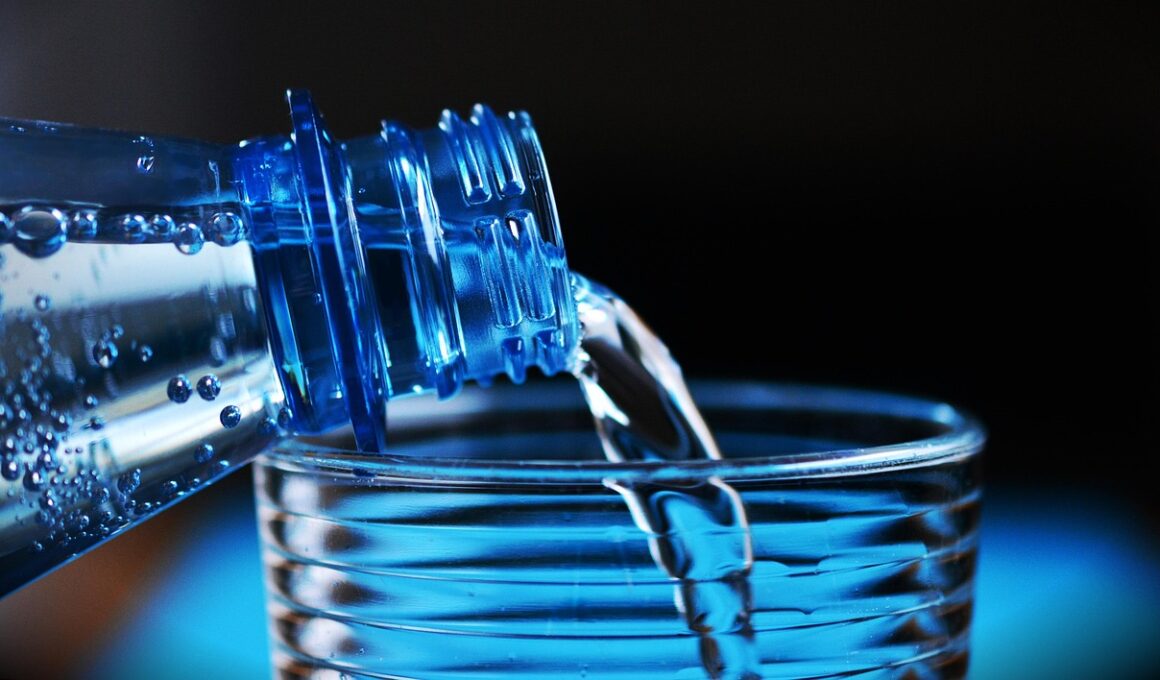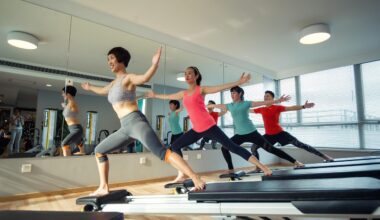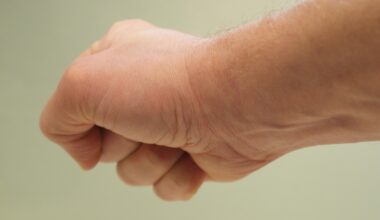Hydration Strategies for Peak Performance in Competitions
Optimal hydration is critical for fitness competitors seeking peak performance during competitions. Proper fluid balance directly affects physical and cognitive functions, making hydration strategies essential. Start by incorporating a hydration plan well before the event. It is advisable to begin increasing fluid intake days in advance to fully saturate your body. Monitor your hydration levels by assessing urine color; pale yellow indicates good hydration, while darker shades suggest dehydration. Additionally, focus on electrolyte balance, especially sodium and potassium, as excessive fluid loss can lead to fatigue. Many competitors use electrolyte-rich drinks to replenish what is lost through sweat. To further enhance hydration, consider including foods with high water content, such as fruits and vegetables, in your pre-competition diet. Staying hydrated maintains energy levels, reduces the risk of cramps, and maximizes endurance. Remember to experiment with different strategies during training to find what works best for your body. Overall, establishing these hydration habits will ensure you are in peak condition when it matters most.
Pre-Competition Hydration
The hydration strategy must include a detailed plan leading up to the competition day. Establish a routine for fluid intake, perhaps consuming water or sports drinks at regular intervals throughout the day. As the competition approaches, adjust your fluid intake according to expected weather conditions; hotter conditions may necessitate increased intake. Avoid caffeine as much as possible before the event since it can lead to dehydration. On the day of the competition, drink sufficient fluids, typically around 500 ml or more, a few hours before your event starts. This helps ensure your body is adequately hydrated without feeling overfull. Adjust the timing based on your body’s response to fluid consumption before exertion. Generally, athletes should consume fluids in smaller amounts but more frequently. This facilitates better absorption while minimizing discomfort during physical activity. Always keep an eye on how your body reacts to these changes, as individual needs vary. Being preemptive about hydration sets you up for success when it is time to perform.
When competing, timing your hydration matters immensely. During performance, consider consuming small amounts of fluids periodically, preferably every 15 to 20 minutes. Consistent hydration prevents dips in performance and keeps energy levels stable. For long-duration events, include electrolytes in your drink; however, do not forget to assess personal tolerance to specific products. Experiment during training sessions using your chosen hydration method to discover your ideal quantity and type. It is essential to avoid excessive fluid intake at once, as this can lead to discomfort. Gulping down large amounts may result in gastrointestinal issues that distract from performance. Instead, aim for sipping; this approach allows for gradual absorption and minimizes chances of bloating. Ensure easy access to hydration stations during competitions, so you do not lose precious time seeking fluids. Each event is peculiar, so tailor strategies that will work specifically for your body type and the duration and intensity of the activity. Ongoing adjustments before and during the competition ensure that your body remains adequately hydrated for excellence.
Post-Competition Recovery
Hydration does not conclude once the competition ends; recovery hydration is just as crucial. After the event, rehydrating is vital for muscle recovery and minimizing fatigue. Begin by replacing lost fluids immediately. Lead with a combination of water and electrolyte-replenishing drinks to restore balance. Assess how much fluid you lost during the competition to determine your intake. Pay attention to your body’s signals; thirst is a clear indicator that additional hydration is needed. Consider tracking your weight pre- and post-event, noting any significant loss, and aim to replenish that through hydrating beverages and foods. Eating meals with high water content, such as soups and fruits, can aid in recovery while providing necessary nutrients. It is also beneficial to include protein and carbohydrates in post-competition meals to support muscle repair. Remember that recovery can take several hours; continue drinking adequately throughout the remainder of the day. Staying well-hydrated supports overall recovery, reduces soreness, and refuels energy reserves for upcoming training sessions.
Moreover, hydration aids mental clarity and focus during competitions. Staying well-hydrated enhances cognitive function, which is essential for decision-making and reaction times. It may be beneficial to incorporate hydration strategies in workout routines to build a strong habit before competitions. This way, competitors can cultivate an intuition for their hydration needs over time. As fatigue sets in, mental sharpness often declines, leading to potential mistakes during critical moments. Compare different hydration products you use during high-intensity sessions, analyzing their effectiveness. Some athletes choose to experiment with powdered electrolytes, while others prefer ready-to-drink formulas; understanding the fit for your lifestyle is vital. Good hydration ensures you stay mentally alert, capable of executing technique-driven movements seamlessly. Further enhance your hydration strategies by personalizing them based on your event and body’s unique demands. Regular consultations with nutritionists or trainers can refine your approach, optimizing your performance for competitions. By prioritizing hydration and linking it with mental performance, athletes ultimately support their overall success during fitness competitions.
Additional Hydration Tips
Even with a solid hydration strategy, athletes should be prepared to adapt to unforeseen circumstances during competitions. Factors such as stress, temperature changes, or environmental conditions can drastically affect hydration needs. Keep electrolyte drinks accessible during the event, as they can be crucial during sudden weather changes. Recognizing and reacting to signs of dehydration, such as dizziness or reduced concentration, is vital for any competitor. In certain situations, consider using hydration-testing kits to measure your immediate hydration needs while competing; this allows for quick adjustments. Looking into technology, some athletes use smart water bottles that track consumption, keeping them aware of their hydration levels. In addition to hydration practices, continually educate yourself on nutrition changes that affect hydration. Using digital resources or connecting with more experienced competitors can provide insights on optimizing hydration strategies effectively. The more knowledge you gain around hydration, the more prepared you will be, leading to improved performance. Integrating these additional tips into your routine ensures holistic success within your fitness competition journey.
Ultimately, developing effective hydration strategies is not solely about consuming fluids; it represents a broader commitment to one’s overall athletic performance and health. From early preparation through to post-competition recovery, hydration remains an intricate part of a fitness competitor’s routine. Constant evaluation of how your practices impact performance enables you to adapt and refine approaches. Always keep a detailed log of how your hydration correlates with your performance to facilitate improvements. It becomes crucial as you aim to discern patterns and effectively plan future competitions. Aiming for innovation within your hydration practices can yield phenomenal results while pushing the boundaries of your capabilities. Prioritize staying informed about new hydration research and attend workshops to enhance your knowledge in this domain. Ultimately, reaching peak performance during fitness competitions is attainable through dedicated hydration strategies that nourish your body effectively. Investing time into refining your hydration plan can pay off significantly when competing, allowing you to shine while showcasing dedication and hard work in every aspect.
In conclusion, mastering hydration strategies not only fuels your body but also enhances your overall fitness journey. Reach out to fellow competitors or fitness professionals to discuss and share hydration experiences, evolving together as a community. Engage in discussions surrounding hydration challenges faced by athletes, exchanging ideas for effective solutions. By learning from others and reinforcing successful habits, you can contribute to a thriving competitor culture focused on health and performance. Remember, thorough knowledge of your hydration needs will make a substantial difference when competing. Each event offers lessons that further your understanding of hydration’s role and importance. Focus on details and integrate a flexible approach that applies to your unique routine, which you can adjust according to the context of each competition. Sustained success in fitness competitions hinges on understanding the essence of hydration; it is a continual journey worth investing in. By prioritizing these strategies, your hard work at the gym translates into extraordinary performances on the stage. Prepare well, stay focused, and let hydration be one of your greatest allies in competing.


